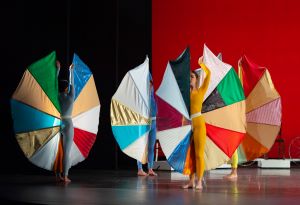The Duke Collegium Musicum performed in the gracious sanctuary at First Presbyterian Church under the leadership of their new director Tom Moore. “A graduate of Harvard, Dr. Moore received his D.M.A. from Stanford. Before coming to Duke in April 2007, he was visiting professor in the graduate program in music at the University of Rio de Janeiro, where he co-directed the early music ensemble, Camerata Quantz. He has recorded five CDs as a flutist [and] sung and recorded as a choral basso with the Symphonic Chorus of Rio de Janeiro [and] Concert Royal and Pomerium Musices of New York.” Maestro Moore is also a member of our CVNC roster of freelance writers.
The program consisted of one work: Missa pro defunctis (Requiem) (1675), by Fancesco Cavalli. Born in Crema in 1602, Cavalli is best known for his contributions to the developing new art form of opera. He was first instructed by his father, and at the age of fourteen entered the choir of S. Marco in Venice, where he sang under Monteverdi. Late in his relatively long life, he was appointed maestro di cappella there. During his lifetime, two collections of his sacred works were published. Unfortunately the Requiem was not published, and the earliest source of the work was not written down in complete form until well into the next century.
The Requiem was composed in 1675, the year before his death. It contains elements of the early Baroque era but is largely Renaissance in style. It survives as an eight-part (double choir) a cappella work. The “Gradual,” “Tractus,” and “Communio” are sung as chants.
There were some beautiful introspective moments in this performance. Portions of the “Sequentia” (“Dies irae”) were dramatic and impressive — evidence of Cavalli’s experience with opera. The sprightly “Sanctus” was reminiscent of a Monteverdi madrigal. The Collegium Musicum also demonstrated that they are capable of exceptional singing.
A chorus of 16 voices (mostly undergraduates) is very exposed and vulnerable to even slight errors. The primary effect left on this reviewer was one of uncertainty and uneasiness in the performance. The singers had their eyes buried in the music most of the time. Some moved their music folders up and down to keep the beat and others bobbed their heads in time. At cadences, it was obvious when all finally looked up at the director and he switched from beating time with one hand to raise both arms producing an overly dramatic closing resolution at the end of each passage. Consequently the ensemble was shaky and imprecise at times, and phrasing was less than impressive. There were some small faults in performance decorum such as scratching a cheek, brushing hair back, individual idiosyncrasies in expressing the music, sipping water, etc. — nothing major, but nonetheless distracting.
It is hoped that Collegium Musicum can give attention to these distractions, learn the music and text more thoroughly, and provide a performance in the spring that attains the higher level of art of which I am sure they are capable.











